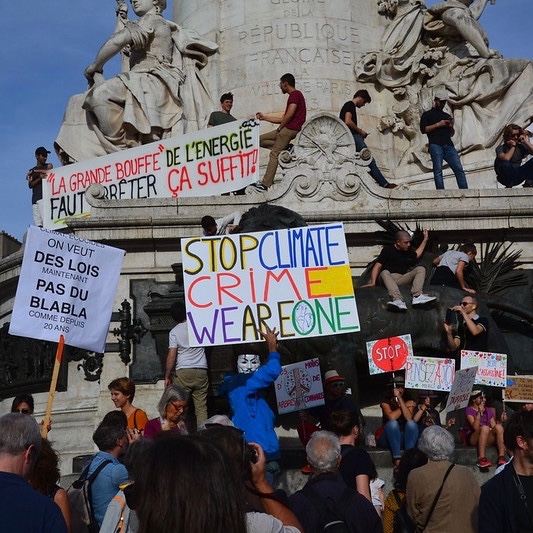Across the world, the impact of climate change is taking hold. Wildfires have swept across Europe this summer, spurred by record breaking temperatures. Droughts are choking communities across the world; from Mexico, where four states have declared a state of emergency, to France, which is experiencing its worst ever drought, and the horn of Africa, facing repeatedly reduced rainy seasons, leading to the worst food crisis for a generation. Early in the year, extreme storms hit southern Africa and Madagascar, compounding impacts felt by many of the same communities in 2018, demonstrating the insurmountable harm caused by increased frequency and intensity of climate impacts. At time of writing, Pakistan is being devastated by catastrophic monsoon floods, destroying hundreds of thousands of homes, millions of acres of agricultural land and leading to the loss of more than a thousand lives.
The United Nations Framework Convention on Climate Change (UNFCCC), which had its 26th annual conference last year in Glasgow (Cop26), is currently not addressing these issues. Implementation of the Paris Agreement is instead focused on preventative climate action, in the form of commitments to reduce greenhouse gas emissions or adaptations to help withstand future impacts of temperature increases. However, as climate impacts take hold, a gap is emerging around how we support the people who are already suffering from the impacts of climate change. This is the issue of Loss and Damage, and it is fast becoming the key sticking point in global climate diplomacy.
Loss and Damage is particularly important to leaders of developing countries, whose populations are already experiencing immense suffering due to climate change, and yet who have contributed little to the climate crisis. The issue is therefore a core priority for Catholic actors, who are organising ahead of COP27 in Egypt in November. To support their efforts, on the 8th September we are publishing a paper which considers the issue of Loss and Damage in light of the gospel, church teaching, and Catholic Social Teaching principles.
This document, entitled Signs of the Times: A Theological Reflection on Loss and Damage proposes that progress on this issue at COP27 is the preferential option for the poor. It argues that the current discourse on climate change is born of privilege by countries in the Global North, who are relatively untouched by the worst human impacts of the crisis. Their focus on reducing emissions, often by setting targets long into the future, is failing to treat the crisis as an emergency. Their obsession with business as usual solutions betrays their prioritisation of maintaining the status quo without duly considering people in developed countries. It demonstrates a failure to act in the spirit of solidarity and the common good, and a failure to regard all of God’s children as part of the same human family.
People on the frontlines of droughts, floods, sea-level rise and desertification cannot wait for "net zero by 2050". That’s too late. They also need support now, and any interpretation of climate change as merely a future economic challenge is missing God’s call on us to respond to the cry of the poor and the cry of the earth.
In his latest encyclical, Fratelli Tutti, Pope Francis proposes dialogue and encounter as a means of building a more just and healthier world. The Pope uses the Good Samaritan as a model of the solidarity that is needed in the world by which he calls the rich countries to reach out to poorer nations and help them in their need. Francis’ proposals are akin to what Walter Bruggemann calls “prophetic imagination” - calling us to think outside of the normal way of doing things, and see the world that God wants us to build. In the spirit of prophetic imagination, our world leaders must engage with the reality of the climate crisis, read the signs of the times, and act proportionately to the grief and despair endured by poor people across the world.
The failure to act on the issue of Loss and Damage for so many years shows that world leaders are failing to understand this reality and to have a prophetic imagination. The success of the UNFCCC and the Paris Agreement is vital to securing a future for all peoples across the world. Yet to achieve this requires the cooperation of states with wildly different experiences and complicities in the climate crisis. Acting on Loss and Damage would be a demonstration of solidarity from developed countries, and a sign that they are listening and responding to the cry of the earth and the cry of the poor.
As COP27 approaches, in the context of mounting climate impacts, we are reminded of the absolute priority of the success of global forums to find solutions borne of compassion and solidarity, which are for the poor and in pursuit of the common good. A financial mechanism for Loss and Damage is an absolute priority in achieving this, and people of God must not shirk our call to leaders of developed countries to deliver that solution in Egypt later this year.
Bishop Charles Kasonde is the Chair of the Association of Member Episcopal Conferences of Eastern Africa
Support SCIAF’s Time to Pay-Up Campaign, calling on the new Prime Minister to promote action on Loss and Damage at COP27 https://www.sciaf.org.uk/get-involved/campaign
The paper Sign of the Times: A Theological Reflection on Loss and Damage will be published on 8th September and accessible at www.sciaf.org.uk



 Loading ...
Loading ...
What do you think?
You can post as a subscriber user ...
User comments (0)